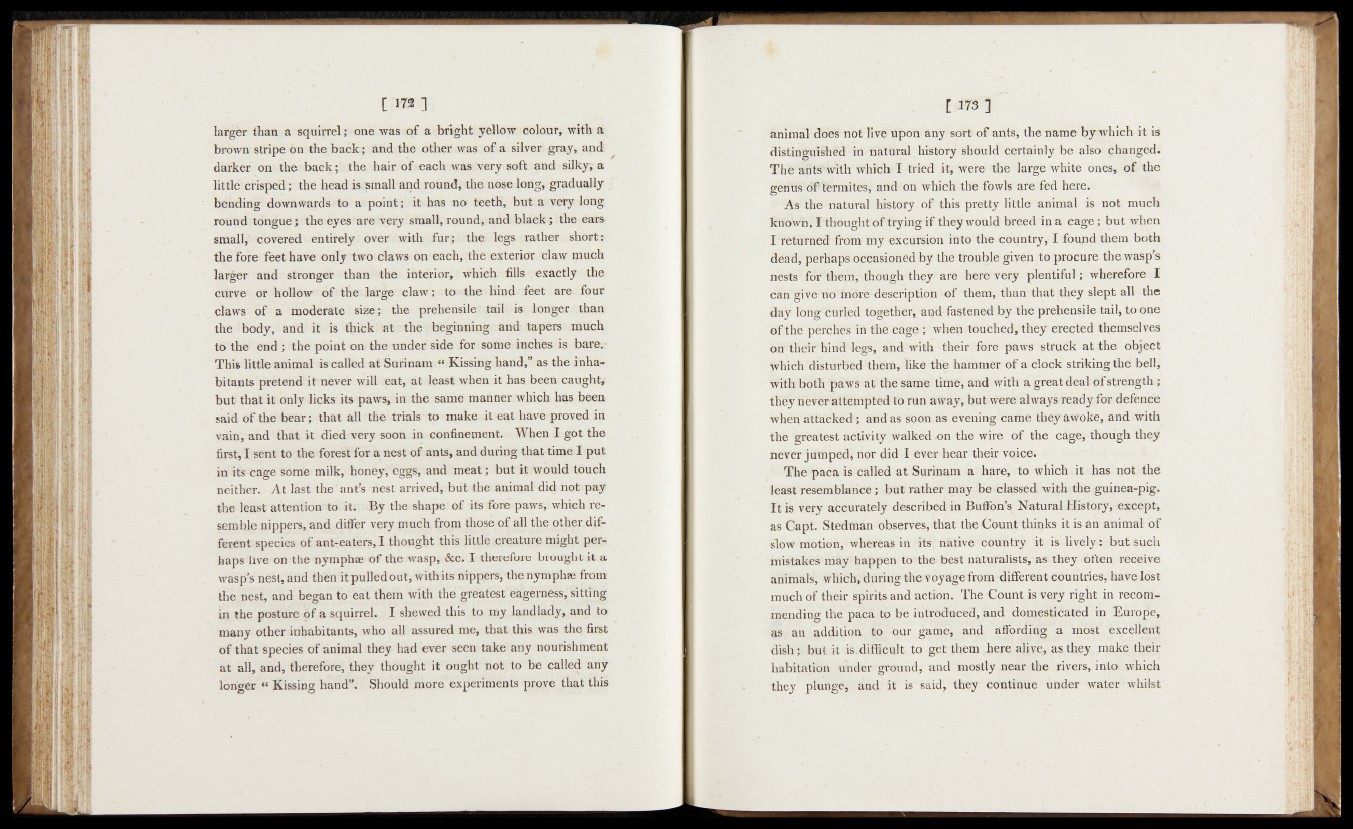
[ l1» L
larger than a squirrel; one was erf a bright, yellow colour, with a
brown stripe on the back ; and the other was of a silver; gray, anti
darker on the back; the hair of each was very soft and silky; a
little crisped; the head is small and round, the nose long, gradually
bending downwards; to appoint ; it has no teeth, hut a very long
round tongue; the eyes are very small, round, and black; the ears
small,' covered entirely over with fur; the legs rather short r
the fore feet have only two claws on each, the exterior claw ipuch
larger and stronger than the interior, which fills exactly the
curve or hollow of the large claw; to the hind feet are four
claws of a moderate size; the prehensile tail is longer than
the body, and it is thick a t the beginning arid tapers much
to the end ; the point on the under side few some inches is bare.
This little animal iscalled a t Surinam “ Kissing hand,” as the inhabitants
pretend it never will eat, at least when it has been caught,-
but that it only licks its paws, in the same manner which has been,
said of the bear; that all the trials to make it eat have proved in
vain, and that it died very soon in confinement. When I got the
first, I sent to the forest for a nest of ants, and during that time I put
in its tage some milk, honey, eggs, and meat; but it would touch
neither. At last the'anfs nest arrived; but the animal did not pay
the least attention to it. By the shape of its for® paws, which resemble
nippers, and differ very much from those of all the other dif-
ferent species of ant-eaters, I thought this little creature might .per-,
haps live on the nymphse of the wasp, &c> I therefore brought it a
wasp’s nest, and then it pulled out, with its nippers, the nymphfc from
the nest, and began to eat them with the greatest eagerness, sitring
in the posture of a squirrel. I shewed this to my landlady, and to
many other inhabitants, who all assured me, that this was the first
of that species of animal they had ever seen take any nourishment
at all, and, therefore, they thought it ought not to be called any
longer “ Kissing hand”. Should more experiments proye that this
M J p J
animal does not live tipon any5 sort of ants, the name by which it is
distinguished in natural history should certainly be also changed.
The afits%ith which I tried it, were’ -the ' large white ones, of the
geÉfffis^dï’îérmites, and on whichr.th‘e fowls are fed here.-
As the-natural history of this pretty little animal is not much
knoWn, Rhought of trying iff they woüld breed in a cage; but when
TŸêt'hfned from mÿ excursion into the country, I foupd them.both
dead, perhaps occasioned by the trouble given to procure the wasp’s
nests- for them,-though1 they' afëhere very plentiful; wherefore I
can give no In dre ^description -of them, than that they slept all the
day long^urljed togethér, aijd-fastened by the prehensile tail, to one
of the perches in the cage ; when touched', they erected themselves
o n ’theirbind l^ s^ an d with theiri före paws struck at the object
which disturbed them, dike the hamnrêroi'adlock strikingthei bell,
with both paws at the same time, and with a great deal of strength ;
they flfeter attempted lb run away,
when attacked ; and as soon as evening came they awoke, and: with
the greatest activity walked-on the wire of the, cage,’ though they
never jumped, nor did Î ever hear their voiee.* \
The paca is called at Surinam a hare, to which tit has not the
least resemblance ; but rather may be classed with the guinea-pig.
It is very accurately described in Buffon’s Natural History; except,
as Gapt. Stedman observes, that the Count thinks it is an animal of
slow motion, whereas in its native Country it is livëly: butSück
mistakes may happen to the best naturalists, as they often receive
animals, which, during the voyage from different Countries, have lost
much of their spirits and action. The Count is very right :in; recommending
the paca to be introduced, and domesticated’ in Europe,,
as an addition to, our game, and affording 4 ’ me|'tr excellent
dish ; but it is,difficult to get them here aliyp, as they make their
habitation under ground, and mostly near the rivers, into ; which
they pLunge, and it is said, 'they continué *hnder water -whilst